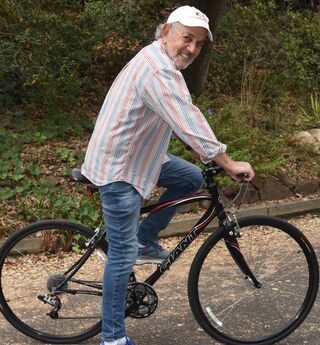Cognition
Does Thinking About Exercise Make You Uncomfortable?
Certain thoughts can make it difficult for a person to get active.
Posted September 23, 2021 Reviewed by Vanessa Lancaster
Key points
- The word "exercise" can trigger bad feelings for those who have performance anxiety.
- When exercising, constantly evaluating self-performance is counterproductive.
- Decreasing performance anxiety makes it more enjoyable to exercise.
When I gave workshops on weight control, I sometimes referred to exercise as “The E Word.” Many of the participants had bad feelings about their attempts to exercise. If I just mentioned the word “exercise,” I noticed people in the audience shuddering, groaning, or displaying sour expressions. Why did this word provoke such negative reactions? How did you feel when you saw the word in the title of this post?
If any of this resonates, look back at past exercise that you’ve done. Was it playing a sport? Did you go to a gym or an exercise class? Maybe you tried an activity on your own like aerobic dancing, jogging, or lifting weights. Whatever it was, stop for a moment and picture yourself in the midst of that activity. Watch yourself doing it…then recall what you were thinking at the time. In addition to remembering the physical sensations, you were probably evaluating your performance. Did you have thoughts like:
- I don’t know how to do this.
- People can see that I’m not doing it right, and it’s embarrassing.
- My goal was…but I’ll never get there.
- I’m doing it wrong; this isn’t for me.
Amanda, a 38-year-old workshop participant, told me that she joined an aerobic dance class but couldn’t “get the hang” of the dance moves. She said she was out of step and felt foolish when her hands were up in the air while everyone else had finished that move.
If you’ve had similar experiences with an activity, one possible reason for your discomfort with it is a result of performance anxiety. This is the fear that you’ll make a mistake, do it incorrectly, or embarrass yourself in front of other people who will judge you harshly.
According to Sari Shepphird, a noted sports psychologist, it’s counterproductive to judge or criticize yourself when you make a mistake when exercising. Instead, she suggests that you can choose what to pay attention to and learn to focus your attention on the task at hand. You can ignore concerns about your performance, and don’t worry if it’s good enough or how others will see it. Instead, practice a non-judgmental attitude while you’re doing the activity.
Here are some things you can say to yourself when self-doubt takes over:
- Who cares how well I’m doing? All that matters is that I’m doing it.
- I don’t give a *&^$# what anyone thinks of my performance; this isn’t a performance!
- Maybe it’s not going as well as the last time, but I’m still sticking with it now.
- I don’t feel so coordinated this time, but who cares?
I asked Amanda if she still enjoyed dancing. She enthusiastically answered, “YES!” I encouraged her to continue attending the aerobic dance class and challenge her thinking, which led to her performance anxieties. With some practice, she was able to accept that her dancing wouldn’t be perfect. Amanda was doubtful but told herself, “so what if I’m out of synch with the rest of the class. I’m enjoying moving my body to the music.” Initially, it was hard, but after several weeks, she reported having fun when she cut out the self-criticism. Not surprisingly, she was more in synch with the rest of the class.
Often performance anxiety is combined with other issues making exercise difficult.

but decreasing performance anxiety is a start to help you tackle your bad feelings about exercise.


